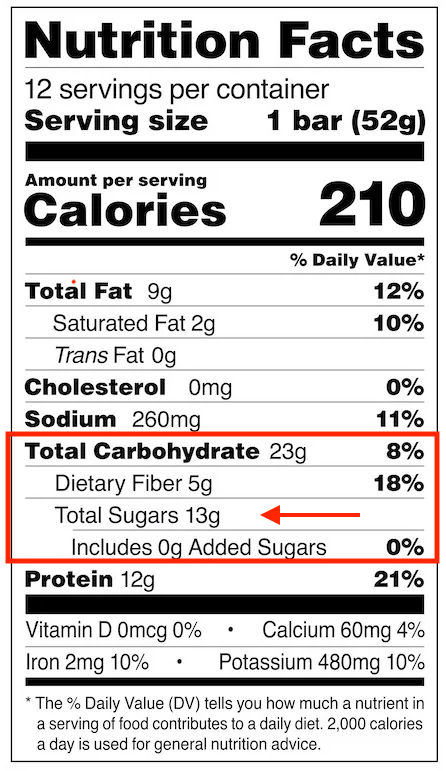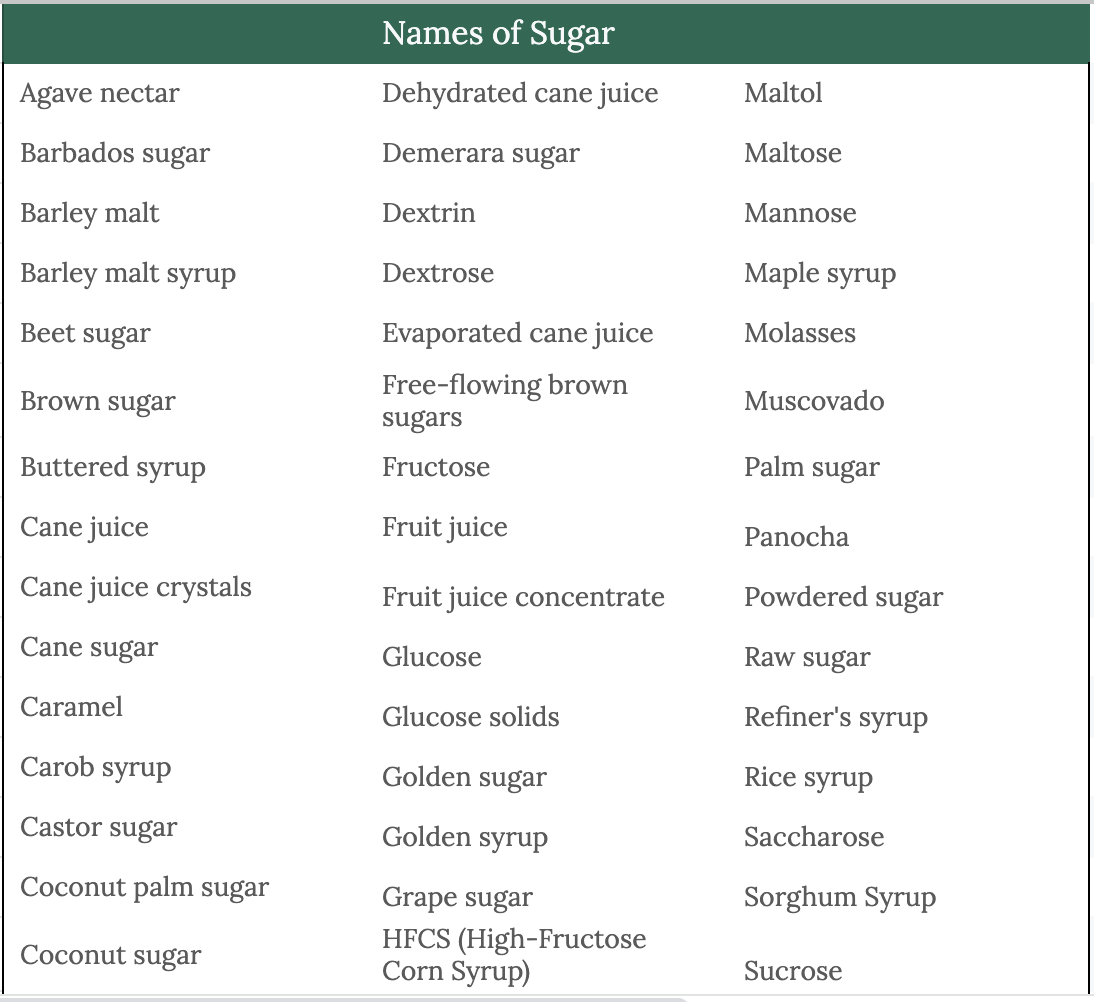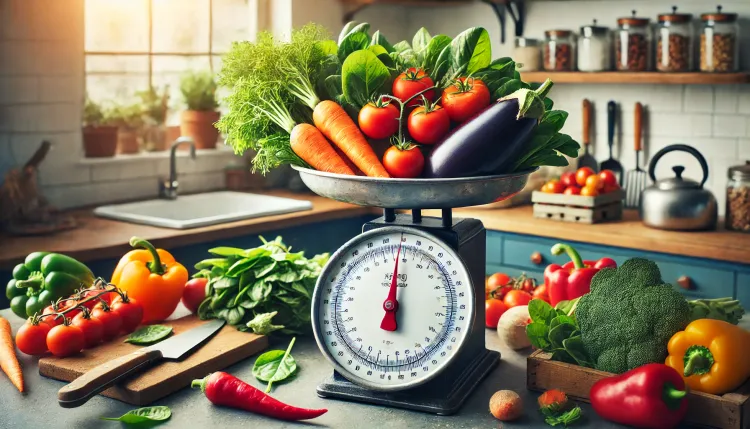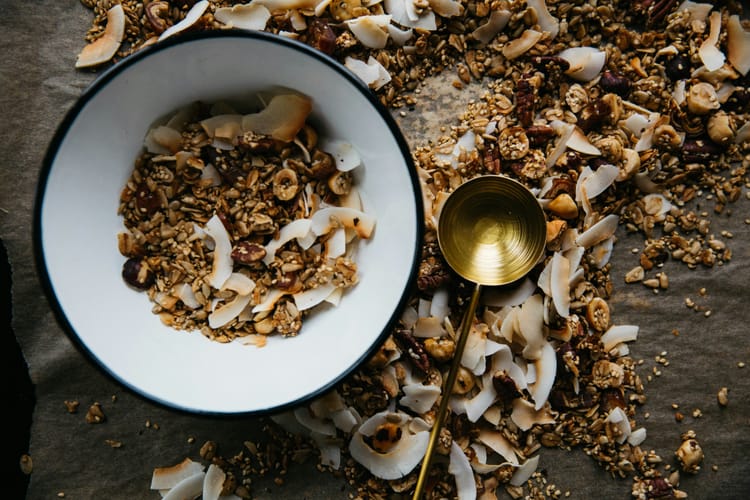Is Sugar Really That Bad?

Whats in this read:
- What is sugar
- How to identify sugar in foods and its impact on health
- Tips to reduce consumption
Sugar gets a bad rep in the health industry – for good reasons: a whole host of negative health outcomes is linked to overconsumption of sugar. However, sugar isn't always bad. It makes sense to be more conscious of sugar consumption and try to limit it when you can. In this read, we break down what exactly is sugar, how to read sugar in food labels (which isn't always straight forward), and basic tips you can adopt to reduce sugar intake.
What is Sugar?
Sugars are a type of carbohydrate but its first important to understand the difference between different types of carbs. While sugars are a type of carbohydrate, not all carbohydrates are sugars. Carbohydrates are a category of nutrients that encompass sugars, starches, and fiber – they can be either simple or complex.
- Sugars (Simple) are quickly converted by the body into glucose, which provides immediate energy. These are simple carbs.
- Starches (complex), another carbohydrate type, also break down into glucose but do so at a slower rate, providing a more gradual energy release.
- Fiber (complex), however, is a form of carbohydrate that the body cannot digest, adding bulk to the diet instead.
Understanding sugar on Nutrition Facts Label on Foods
Sugar is found under the 'Total Carbohydrate' line on a nutrition facts label. This includes the dietary fiber, total sugars, and added sugars. There is a difference between added and natural sugars:
- Natural sugars are found naturally in whole foods like fruits, vegetables, and dairy products. For example, fruits have fructose, and milk contains lactose. These natural sugars come along with other nutrients like fiber, vitamins, and minerals, which help your body process them more slowly and keep your blood sugar steady.
- Added sugars are sugars that are added to foods and drinks during processing or preparation. This includes sweeteners like white sugar, syrups, or honey that are put into products like soda, candy, and baked goods. These sugars are usually added to improve taste but don't come with the same health benefits as natural sugars. They often cause quick spikes in blood sugar and contribute to weight gain and other health issues if consumed in excess.

Its important to note that you should look at both added sugars and total sugars regardless of whether they are natural or added because our body cannot differentiate between added and total sugars. Any type of sugar causes risk for diabetes and other health conditions.
Sugar can be helpful
Sugar has a bad reputation in the health industry because but its important to acknowledge there is a place for sugar. For instance, glucose is the preferred energy source for the brain. Athletes benefit from sugar to fuel workouts.
Why care about sugar?
The American Heart Association recommends women limit their added sugar intake to 25 grams (about six teaspoons) per day. For men, the recommendation is 36 grams (nine teaspoons) of sugar per day. Today, the average American adult is eating around 72 grams of sugar per day – that's equivalent to
It is widely known that excessive sugar intake can lead to negative health impacts such as weight gain, diabetes, heart disease, and inflammation but it is less known that high sugar consumption can negatively impact brain function.
Chronic excessive consumption of sugar directly impacts our blood sugar levels which can lead to cognitive decline. Glucose and other forms of sugar can significantly impact the brain, particularly in diabetes—a group of diseases marked by prolonged high blood glucose levels. In type 1 diabetes, the immune system attacks insulin-producing cells in the pancreas, disrupting the body’s ability to regulate glucose in the blood. Type 2 diabetes, often influenced by diet and environmental factors, develops when cells no longer respond properly to insulin, leading to insulin resistance.
Both type 1 and type 2 diabetes can have serious consequences for the brain over time. Elevated blood glucose can impair the brain's functional connectivity, which involves coordinated activity between regions with similar functions, and can also affect brain tissue. This may result in brain shrinkage, lead to small-vessel disease that limits blood flow, and cause cognitive challenges. If severe, these changes can even increase the risk of dementia and Alzheimers
How to identify hidden sugars
It is much easier to spot the added sugars in ultra-processed foods but it is the hidden sugars that we should watch out for and avoid if possible. Hidden sugars are sugars that are added to foods that are not obvious – these are typically foods that aren't inherently sweet. Some examples include:
- Ketchup
- Pasta Sauce
- Barbecue sauce
- Salad dressings
- Yogurt (even some yogurts like greek yogurt or coconut yogurt)
- Bread
- Granola bars
- Frozen foods
Reading food labels
- Nutritional facts label: Look for Total Sugars and Added Sugars. These values are typically listed in grams (g) and will sometimes also show the percentage of your daily value (DV) based on a 2,000-calorie diet.
- Names for Sugar: You can find the type of sugar on the ingredient list of a nutrition label. Sugar can be named in a variety of ways (60+).

- Understanding Nutrition Facts: When your evaluating food, take a holistic approach to the food and the intention for that snack or meal. For example, eating a medium-sized apple has around 19 grams sugars while a serving of cheetohs has 1 gram of sugar. An apple has fiber and other nutrients that are more beneficial than the cheetohs. Being mindful for why you're eating is a good starting point. Are you eating because you're hungry or you want a sweet treat? If you're hungry, aim to eat a snack or meal that is balanced (has a carb, fat, and protein) rather than food that is sugary. So what is too much sugar? Remember, the recommended amount of added sugar per day is around 25-35 grams so you want to take that into consideration.
Tips for Reducing Sugar Intake
There is little evidence that all added sugars must be eliminated from the diet but they should only make up a very small percentage of your overall diet. There are ways to reduce your sugar intake through daily habits such as:
- Choosing Whole Foods: eat fruits, vegetables, whole grains, and lean proteins.
- Beware of “Healthy” Snacks: Snacks marketed as healthy can be loaded with added sugars and sweeteners.
- Alternative Sweeteners: Using honey, maple syrup, or using spices like cinnamon for flavor.
TLDR: Sugar can be harmful when consumed in excess, but in moderation, it can be part of a balanced diet.
Sugar is not inherently bad or good though it does deserve attention when you're trying to make healthier lifestyle choices. As a rule of thumb, eat sugar in moderation but if you aren't good with moderation – eliminate it completely or avoid it as much as possible. There are plenty of healthy options out there that take the place of traditional treats. Having a healthy awareness of what you're eating will get you far.



